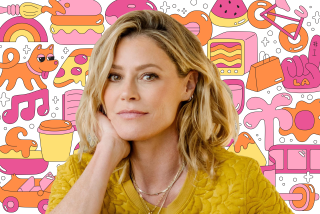Consultant Uses Art to Get People Thinking
- Share via
Artist Nancy Bowen’s courses are designed to help participants tap into the problem-solving part of themselves.
Most people have, on occasion, had a flash of insight that solved a problem, whether personal or in business. But most can’t say what caused the insight, and they certainly wouldn’t know how to repeat it.
Nancy Bowen, an artist and teacher, believes that she has found a way to help people tap into that problem-solving part of themselves.
“And once I discovered that, then I only wanted to go out and change the world,” Bowen says, laughing at her own enthusiasm.
The 52-year-old consultant has a studio in Irvine where she is teaching eight-week courses that use abstract painting, drawing, writing journals and discussion. Her methods are intended to move people from linear reasoning into the world of intuition. She argues that intuitive people take more risks and discover bigger rewards.
Bowen is not alone in her conviction. American companies are turning to creativity training to give them an edge. According to a survey by Training magazine, which polls 2,600 companies with more than 100 employees each year, 42% offered creativity training in 1992, up from 27% in 1991. (The survey, completed over the summer, is published in the magazine’s October issue.)
Rubbermaid Inc., Fidelity Investments, Frito-Lay Inc. and Corning Inc. are among the companies that have creativity-enhancement programs. The Toro Co., a lawn equipment maker, retains an inventor on its staff.
Creativity training methods vary. Author and corporate consultant Anthony Robbins, for example, has had business people walk barefoot on hot coals to expand the mind and focus priorities.
And a man named Roger von Oech has put together a pack of 64 cards with messages that are supposed to jolt the reader out of traditional thought patterns. One card in his Creative Whack Pack reads, “Every child is an artist. The problem is how to remain an artist after he grows up. How can you keep the artist alive in you?”
Bowen believes creativity can be tapped through abstract painting. It requires risk. It’s playful. There are no rules.
One of her methods is to have students focus on a problem while they paint and try to let that problem determine what ends up on the canvas. Then, Bowen comes by and turns the canvas on its side. Or she instructs the student to paint lines that intersect the shapes he or she has drawn. Anything to “get some movement going,” as she puts it.
So far, Bowen has impressed individual business people who have taken her class. But her pitches to local businesses, where she would like to be hired to give seminars, are not bearing fruit.
“The thing that makes her job tough is she needs to create an awareness that there’s a need for this type of training in the first place,” said David L. Ross, a Los Angeles-based management consultant who is planning to invite Bowen to present her ideas as part of his workshops.
Ross, whose clients include Arco, First Interstate Bancorp, Northrop Corp. and Sunkist Growers Inc. teaches communications skills to executives.
“Nancy does a really good job in a nonverbal way of breaking barriers down,” said Ross, who met her through a client who had taken Bowen’s class. “She leads people to trust parts of themselves that they’re not used to listening to.”
Bowen formerly owned a fine arts wholesale company, Nancy E. Bowen Studios, which had nine employees. She closed the 6-year-old business in early 1987 and began selling her work through a Vancouver art publisher. In January, 1988, she and her son opened their own art publishing business, South Coast Fine Art Editions Limited. That business failed in December, 1990, Bowen said, because the market for art was evaporating with the country’s economic health.
She has exhibited her own work, mostly impressionistic oil paintings, for a dozen years and has been featured in articles in American Artist and Sunstorm magazines.
The failed business venture made Bowen rethink what she was doing in her art and her life. She switched from oil to acrylics and began to try abstract art, and felt the new style was teaching her about herself and about how to make decisions that would lead to happiness and growth.
She began teaching a class in abstract art at the Irvine Fine Arts Center in the winter of 1991, and decided the method could work for more than just artists.
“I had discovered it personally, and during the class I realized it was a tool for everybody,” she said. “The students were saying that in their personal and business decisions, they felt greatly empowered. They had the nerve to step outside of their comfortable or boring lives.”
We would like to consider your story about women in business or issues that affect businesswomen for a column. Call O.C. Enterprise at (714) 966-7871.
More to Read
The biggest entertainment stories
Get our big stories about Hollywood, film, television, music, arts, culture and more right in your inbox as soon as they publish.
You may occasionally receive promotional content from the Los Angeles Times.










